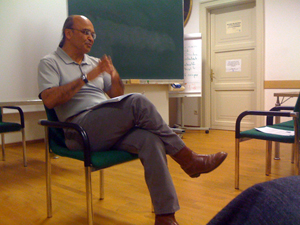American Corner Innsbruck
Lecture by Prof. David Wilkins
MEASURED SOVEREIGNS: A POLITICAL/LEGAL HISTORY OF INDIGENOUS PEOPLES IN THE UNITED STATES
Nov. 13, 2009, 5.30 p.m., Saal University of New Orleans (main university building, 1st floor)



In the United States November is celebrated as the National American Heritage month. Even though indigenous peoples have mixed feelings about this commemoration (especially because it is celebrated right after “Columbus Day” in October), it serves as a good possibility to address the political and legal situation of native peoples in the United States.
In a very captivating talk, Professor David Eugene Wilkins, a member of the Lumbee Nation, gave a fascinating overview of the legal and political situation of indigenous peoples in the United States. Native rights have always existed outside the U.S. Constitution and therefore been in jeopardy. Professor Wilkins explained how this has led to an ambivalent and paradoxical legal status of native nations, which has resulted in schizophrenic relationships with the U.S. government. Even today, tribal nations are legally seen as “domestically dependent nations,” whose political situation is very fragile because it gives U.S. Congress the power to basically wipe them out. During different historical periods, i.e. the removal period, the reservation period, the general allotment period, and finally the indigenous renaissance, their political status and legal standing have constantly changed. Therefore there are discrepancies between federal and state laws concerning the rights of Native Americans, who have to fight for their rights to even be heard by the Supreme Court.
The political status is, as Wilkins pointed out, a ‘mixed bag’ because Indian self-determination, i.e. the right to their own governments and executive powers, results in many questions left unaddressed by the Americans who claim political and legal power over the state they inhabit.
Native Americans have high hopes in President Obama, who, for the first time since Bill Clinton in the 1990s has met with leaders of all 564 recognized Native American and Alaskan peoples this year.
Professor Wilkins was brought to Innsbruck through the U.S. Embassy in Vienna. The event was co-hosted by the Austro-American Society, the University of New Orleans Center Austria, and the American Corner Innsbruck.
(text: Claudia Schwarz)
David E. Wilkins
Professor David Eugene Wilkins is a Professor of American Indian Studies, Political Science, Law and American Studies at the University of Minnesota. He teaches and writes in the areas of comparative politics, American political theory, federal Indian policy, tribal government, and history of colonialism and native peoples.
Professor Wilkins received his B.A. degree in Sociology from Pembroke State University in 1976, his M.A. in Political Science and American Indian Policy from the University of Arizona in 1982, and his Ph.D. in Political Science from the University of North Carolina-Chapel Hill in 1990. From 1984–87, Professor Wilkins was an instructor at the Navajo Community College,Tsaile, Navajo Nation, Arizona. In 1990, he was an adjunct lecturer and from 1991–97 an Assistant Professor for the Department of Political Science and American Indian Studies at the University of Arizona. He has been at the University of Minnesota since 1999. Professor Wilkins is currently serving as Chair of American Indian Studies.


